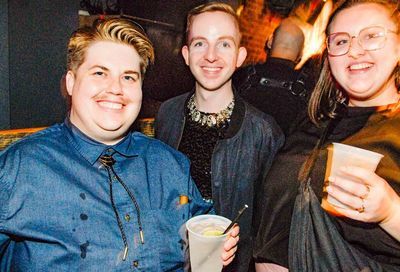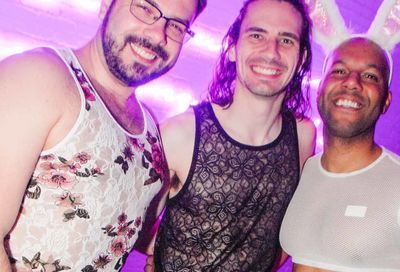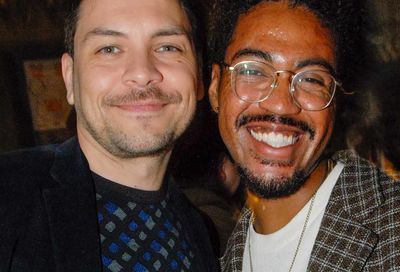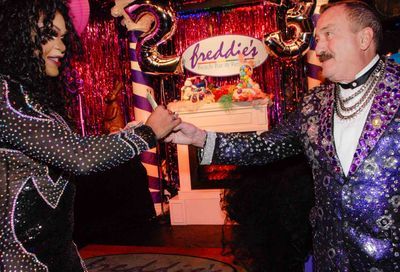Voice of Reason
Alphabet Soup
In a chaotic living room in Iowa, where conversations between nine adults were shouted over four toddlers and pre-schoolers playing with toys and occasionally breaking into fights, the chat in my little corner turned to Queer as Folk.
My partner and I were sitting near my friend Sarah’s younger brother, Mike, who’s a gay man living in rural Iowa between two decent-sized cities, one of which is well known for its progressive politics and relatively open social atmosphere. He’s polite and well-spoken and he looks like a younger, cuter Noah Wyle.
I don’t know Mike too well — he was too young for my gang to hang out with him when we were in high school, and probably going through some pre-adolescent male stuff that made him that much more inaccessible to me.
But I know some things about him, like that he was adopted into Sarah’s family after a horrible, abusive start to his life. I know he’s had a rough time, and that realizing he was gay was not helpful to the emotional adjustments he already had to make. Sarah once told me that Mike has at times especially struggled with how it feels to be gay in Iowa, even near a relatively progressive city, and I know pretty well what he means.
I know that despite every absolutely wonderful thing about the state, there is a chill there for gay people that is colder than any blustery winter day when the temperature drops into the negative double digits. This is true, unfortunately, no matter how wonderful one’s family is, like Mike’s family and my own. It’s somehow colder to me there than it is here when the occasional random piece of anti-gay garbage blows my way, because here we have enclaves to return to and a prevailing social acceptance when we step outside of them.
Elsewhere in Iowa over the weekend, where I traveled to see my oldest niece graduate from high school, I thought of Mike when I talked to one of my niece’s relatives on her mother’s side that I hadn’t seen in years. He had to think a minute to remember my name but was friendly to me, and I then introduced him to my partner, using that word to describe her. He said nothing in response and turned away. It’s possible he didn’t hear me. It’s also quite possible that he did.
Back in that living room gathering with Sarah and my other high school friends, their spouses and their offspring, Mike mentioned to Kim and me that we should get Showtime, that we’re really missing out on something if we don’t have it. I had a feeling I knew what he was getting at, but gently pushed the issue. “What’s that?” I asked him.
My heart broke when his voice lowered a little as he said, “Queer as Folk.” Maybe he was being extra-considerate of the young children in the room, but they were paying no attention to us at that point, and wouldn’t have flinched if they had been. Maybe he was worried about what the room full of straight people would say in reaction to that title or that topic, but I can’t imagine a safer space than among that group of people, and I hope he knows it.
I told Mike then, and I meant it, that he should visit us sometime, that we’d put him up and show him around D.C. What I didn’t say explicitly, out of what I later identified as a knee-jerk desire to not make him uncomfortable, was that we’d show him all the gay places. He seemed a little intimidated by the idea of traveling on his own, explaining that he really hasn’t been to a big city outside the Midwest on a solo trip.
Our conversation then turned to a few other gay topics and I was relieved that he didn’t seem to feel the need to continue whispering. I found myself wishing we had several more hours, not just the quick stopover we both were making on our way to graduations in opposite directions.
That too-brief chat with Mike keeps replaying in my mind like a calling of some sort to do something, I don’t know what. Help him, maybe, somehow, even though he is not asking for my help and probably doesn’t need it. But he’s a younger sibling of one of my best friends, so that holds him in a certain category of vulnerability in my mind, whether or not it’s true.
I often think of what it would mean to land back in the middle of the country having flung my figurative closet door as wide open as it will go. I never have succeeded in wrapping my mind around it. I know it’d be easier for me to replant myself there than to have stayed, having acquired some of the confidence and stamina necessary to weather social disapproval during slightly more than a decade on the East Coast, and having watched my hometown and state experience some emotional growth in the time that I’ve been away. But I know that ultimately, it’s not enough.
I think of the ways in which gays too often acquiesce to the demands of a cold-shoulder society — demands to fit in, to keep quiet, to whisper when we say words others might find objectionable.
The answer to it all may lie with my youngest niece, who’s 16-months-old and was a delightful diversion to the pomp and circumstance once her older sister crossed the graduation stage at the beginning of the alphabet. She sat on my lap through much of the ceremony, scribbling on a notepad in purple and blue crayon.
Cassie is employing the contemplative approach to vocabulary-building, taking it all in but not letting on much of what she knows. Her two favorite words are “uh-oh” and “no.” She says “no” like it’s going out of style and in this sweet little decisive voice, to all manner of statements with any sort of inflection — orders, questions, sometimes random observations that are directed her way.
If you ask her something she does not understand — her dad’s favorite example is, “Do you want a million dollars?” — she will say, in her tiny amazing voice, “No.” I hope she never stops saying it with the frequency and abandon reflected in her speech patterns today.
I hope she always remains unafraid to say exactly what she thinks, to say no when she feels it, to express her firm preference for the negation of what someone is telling or asking her.
I hope she stays strong and does not let herself suffer over some insurmountable need to please. I hope she continues to set a good example for all of us, in Iowa and beyond, who may need a little encouragement asserting ourselves sometimes.
Kristina Campbell is still practicing the art of making “no” sound sweet. “Alphabet Soup” appears biweekly, and its author can be reached at kcampbell@metroweekly.com.
Support Metro Weekly’s Journalism
These are challenging times for news organizations. And yet it’s crucial we stay active and provide vital resources and information to both our local readers and the world. So won’t you please take a moment and consider supporting Metro Weekly with a membership? For as little as $5 a month, you can help ensure Metro Weekly magazine and MetroWeekly.com remain free, viable resources as we provide the best, most diverse, culturally-resonant LGBTQ coverage in both the D.C. region and around the world. Memberships come with exclusive perks and discounts, your own personal digital delivery of each week’s magazine (and an archive), access to our Member's Lounge when it launches this fall, and exclusive members-only items like Metro Weekly Membership Mugs and Tote Bags! Check out all our membership levels here and please join us today!





















